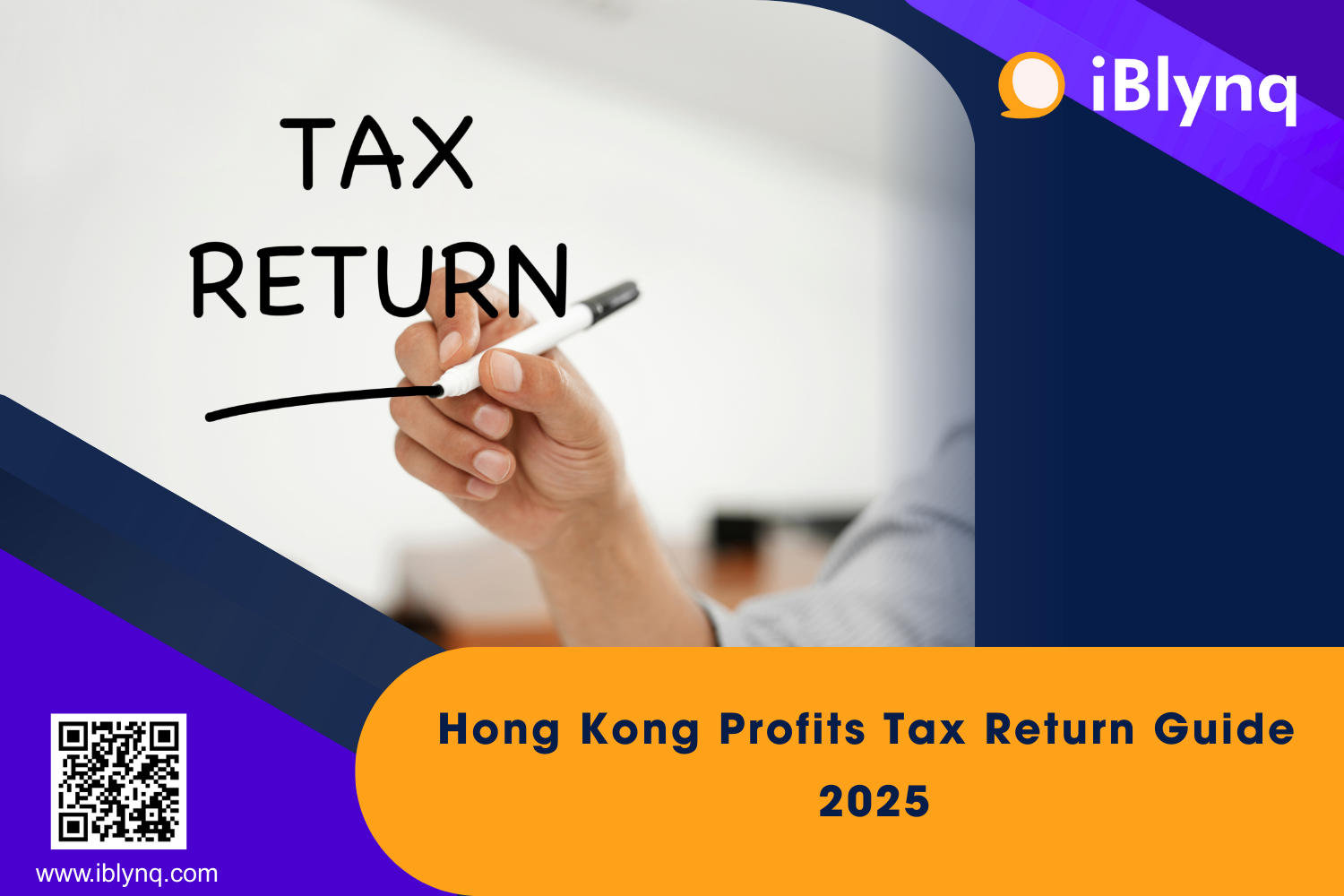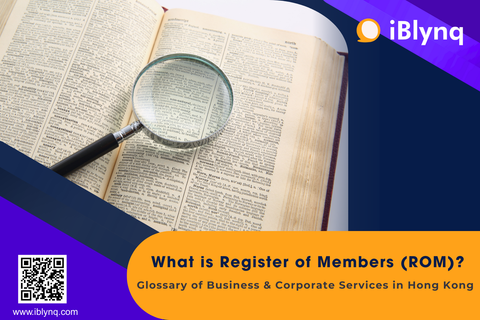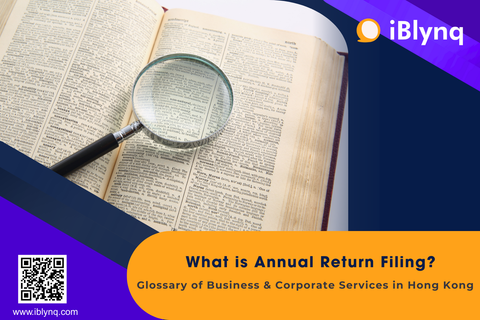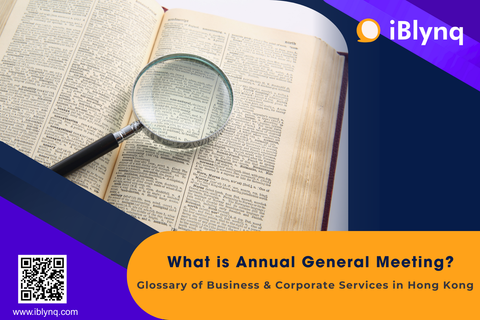Hong Kong Profits Tax Return Guide 2025
Updated: 9 Jun, 2025
Whether you're running a limited company, unlimited company, or working as a self-employed person in Hong Kong, you must understand how Profits Tax Return (公司報稅) works. It can help business owners manage their finances and stay compliant with local tax laws.
In this quick guide, iBlynq will explain profits tax filing processes, deadlines, tax rates and answer common questions about business income tax filing.
What is Profits Tax (利得稅)?
Profits Tax is a tax on business income in Hong Kong. If you run a business, you pay tax on profits earned in Hong Kong. This means tax is only charged on assessable profits, not revenue. This tax applies to:
- Limited Companies (有限公司)
- Unlimited Companies (including sole proprietorships 獨資經營 and partnerships 合夥經營)
- Self-Employed Persons (自僱人士)
What Types of Businesses Need to File Profits Tax?
Businesses that need corporate tax returns include:
- Limited companies (e.g. corporations)
- Sole proprietorships (a business owned by one person)
- Partnerships
- Self-employed persons / Freelancers
Basically, if you earn money from running a business or offering services on your own, you must file profits tax. This applies to online sellers, influencers, freelancers, content creators, etc.
Remark: “sole proprietorships” and “partnerships" are different forms of unlimited companies.
If your business in Hong Kong also has employees, don’t forget about the Employer’s Return (Form IR56A / IR56B / IR56F). Check out our Hong Kong Employer’s Return Guide 2025 for a step-by-step explanation.
Hong Kong Profits Tax Rates
Hong Kong uses a two-tier profits tax rate system for business income tax filing:
-
First HK$2 million of profits:
> 8.25% for corporations
> 7.5% for unlimited companies / self-employed
-
Above HK$2 million:
> 16.5% for corporations
> 15% for unlimited companies / self-employed
How to Calculate Assessable Profits
In simple terms, your assessable profits = Total Taxable Revenue - Allowable Business Expenses - Allowable Tax Allowances
Example:
Let’s say your online business made HK$500,000 in total revenue for the year.
Your allowable business expenses (like rent, advertising, supplies, etc.) were HK$200,000
And your allowable tax allowances were HK$50,000
So, your assessable profits = HK$500,000 - HK$200,000 - HK$50,000 = HK$250,000
On the other hand. if your expenses were equal to or more than your revenue, your assessable profit would be HK$0, and you might not need to pay tax, but you still need to file your annual tax return.
What Expenses Can Be Deducted?
When doing company tax submission, you can deduct business-related costs, such as:
- Staff salaries
- Office supplies
- Office rent
- Utilities (electricity, phone bills)
- Repairs and maintenance
- Capital expenditure on certain assets (e.g. computers)
- Advertising and marketing
- Business travel
- Audit and professional fees
However, personal expenses are NOT deductible.
Reporting Business Losses
If your business has a loss, you can carry the loss forward to future years. This means if your business makes a profit later, the earlier loss can be used to reduce the taxable profit. This helps lower the amount of tax you need to pay in the future.
Example:
If you lost HK$50,000 last year and made a profit of HK$100,000 this year, you only need to pay tax on HK$50,000.
Remember to keep clear records of your business losses, including receipts, invoices, and expense details. These records help prove your loss if the tax office asks for them.
Remark: no tax is paid when there is a loss, but you still need to report it and keep proper records.
Profits Tax Filing Process
1. Receive Tax Return from IRD
Every year, the Inland Revenue Department (IRD) sends profits tax return forms to businesses. Usually, these forms are sent out in early April.
You will receive one of the following forms depending on your business type:
- BIR51 – for corporations (limited companies)
- BIR52 – for partnerships
- BIR60 (Individual Tax Return) – for sole proprietors (issued in early May)
2. Fill and Submit the Tax Return
Fill out the correct tax return form based on your business type. You also need to prepare and attach supporting documents, which usually include:
- A copy of your financial statements (profit & loss account, balance sheet)
- A tax computation (showing how assessable profits are calculated)
- A copy of your audited accounts (required for limited companies)
OR a summary of income and expenses (for sole proprietors and small businesses)
3. Submit the Tax Return on Time
- You must file your tax return within 1 month from the issue date.
- Deadline Extension can be available, depending on the financial account year date.
- It’s important to meet the deadline to avoid penalties or fines. If unsure, consider working with a tax accountant such as iBlynq.
How to Apply for Tax Filing Extension?
You may apply for a filing extension if:
- You hire a tax representative (under Block Extension Scheme)
- Your accounting year ends on 31 December or 31 March
Profits Tax Filing Timeline
First-Time Tax Filing
If you're a new business, You will receive your first profits tax return approximately 18 months after business registration. You must file within 3 months. If you don’t receive it, you should request tax filing from IRD.
How to Request a Tax Return?
If you haven’t received a tax return, visit the IRD website and fill in a request form or contact IRD by phone or in person.
Regular Tax Return Deadlines
| Accounting Date |
Extended Due Date
|
| 1 April 2024 - 30 November 2024 (Accounting Date Code "N") |
No extension |
| 1 December 2024 - 31 December 2024 (Accounting Date Code "D") |
15 August 2025 |
| 1 January 2025 - 31 March 2025 (Accounting Date Code "M") |
17 November 2025 |
Documents Required for Filing
- Completed Tax Return (download BIR51 sample here)
- Profits and Loss Statement
- Balance Sheet
- Auditor’s Report (for limited companies)
- Tax Computation
Limited Company Tax Filing vs Unlimited Company Tax Filing
Below is a simplified comparison to help you understand the key differences between Limited Company Tax Filing vs Unlimited Company Tax Filing.
| Limited Company | Unlimited Company | |
|---|---|---|
| Legal Structure | Separate legal entity from owners | Owner and business are the same |
| Audit Requirement | Mandatory audit by a CPA | No audit required |
| Tax Return Forms | BIR51 submission | BIR52 submission (for partnership) or BIR60 submission (for sole proprietor) |
| Filing Deadline | Depends on financial year end |
•For Partnerships, same as for limited companies |
| Documents Required |
• Audited financial statements |
• Profit & loss account • Balance sheet • Tax computation |
| Allowable Deductions | Business expenses only | Business expenses + personal tax allowances ( if you elect for personal assessment) |
| Personal Tax Allowances | Not available | Available: basic, married, child, dependent parent, etc. |
| Tax Rate | 8.25% on first HK$2M profits, then 16.5% |
7.5% or 15% or taxed under personal rates if you elect for personal assessment |
| Common for | SMEs, startups, larger businesses with separate legal setup | Freelancers, small shops, online sellers, self-employed persons |
Late or Missing Tax Filing
All companies registered in Hong Kong — even if not operating or earning — must file corporate tax returns on time.
Since 2024, the IRD has stepped up checks on companies that file late, fail to file, or report false information.
If your company doesn’t comply, you could face:
- Fines
- Court summons
- Criminal charges
Consequence of Late or Missing Tax Filing
|
Late Tax Filing |
Missing Filing |
|
|
Definition |
Failure to submit tax returns and required documents on time |
Submitting tax returns with concealed or incorrect information |
|
Penalties |
•Usually starts from HK$1,200 (depending on how late the filing is and whether there have been any prior non-compliances) |
May be fined up to 3 times the amount of tax underpaid |
|
Other Consequences |
•Receive a penalty notice |
•Prosecution •Must repay the underpaid tax & penalty •Company directors may bear legal responsibility |
FAQs
Q1: Do self-employed people need to do an audit?
No. Audits are not required for sole proprietors or partnerships.
Q2: Can I file profits tax online?
Yes. You can file online using eTAX.
Q3: What happens if I don't file?
Failure to file annual tax return on time can result in:
- Penalties
- Additional tax
- Legal court summons
Q4: Can I claim startup costs?
Yes. Startup costs that are business-related and used to generate income can be deducted, such as registration fees or business software costs.
Q5: Do I get taxed on overseas income?
No. Hong Kong follows a territorial source principle, meaning only income earned in Hong Kong is taxable (unless the Foreign sourced Income Exemption Regime applies.)
iBlynq is here to help
Filing corporate tax return on time is employers's legal duties — and a key part of keeping their businesses compliant.
We’re here to help you navigate the process of completing profits tax return with ease.
Based in Hong Kong, we offer a range of business services to support your business, including accounting and tax consulting, company registration, payroll management and company secretary services and more.
Let us take care of the details so you can focus on what you do best!





